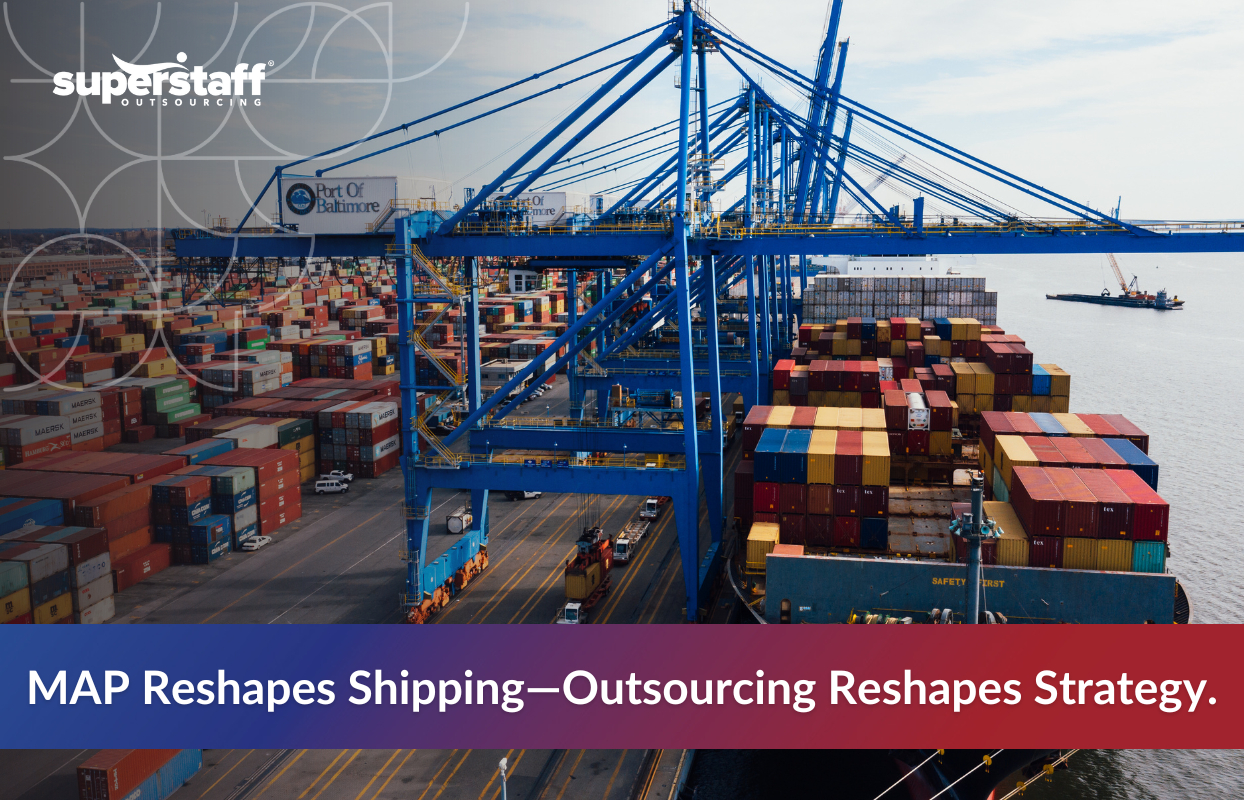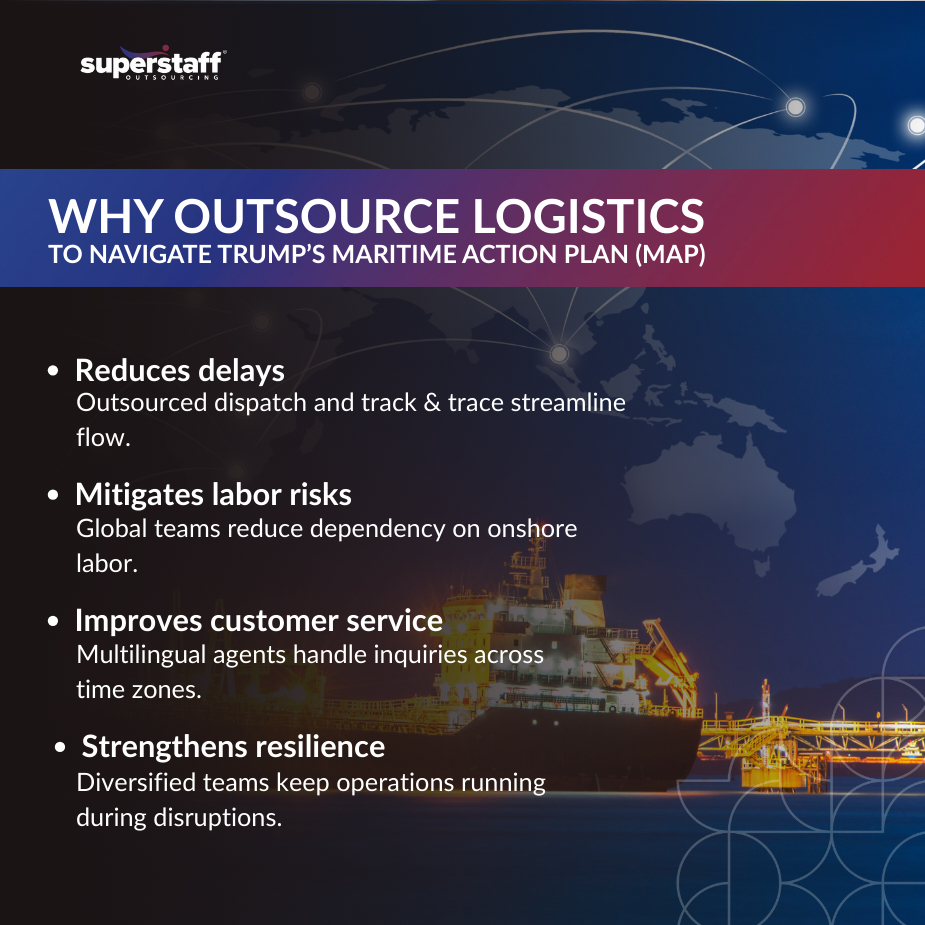
As Trump’s Maritime Action Plan (MAP) takes shape, business leaders are already exploring how to outsource logistics functions to stay ahead of disruption. The plan, aimed at revitalizing the U.S. maritime sector, proposes stricter cargo regulations, increased investment in domestic fleets, and more protectionist trade measures. While these policies seek to bolster national shipping capabilities, they may also trigger new challenges, from rising operational costs to port bottlenecks and labor constraints.
MAP’s sweeping reforms could strain already fragile supply chains, making it harder for businesses to maintain speed, flexibility, and profitability. In response, outsourcing is quickly becoming a strategic growth enabler. Offshore and nearshore teams provide companies with the operational resilience and scalability to navigate uncertain waters.
In this shifting landscape, the ability to outsource logistics functions becomes not just a competitive advantage but a strategic necessity. By partnering with offshore and nearshore teams, companies can maintain round-the-clock operations, reduce overhead, and stay ahead of MAP-related constraints.
This blog explores the far-reaching implications of Trump’s Maritime Action Plan and highlights why outsourcing is emerging as a smart, scalable solution for logistics firms navigating political and economic volatility.
What Is the Maritime Action Plan (MAP)?
Former President Donald Trump’s campaign rhetoric and policy previews have reignited interest in America’s maritime sector by introducing the Maritime Action Plan (MAP). While not yet fully enacted legislation, the MAP forms a cornerstone of his economic nationalist agenda and seeks to reassert U.S. dominance in global shipping.
At its core, MAP is designed to:
- Rebuild U.S. maritime strength
- Reduce dependence on foreign shipping entities
- Revive domestic shipbuilding and port operations
To accomplish this, the plan outlines several proposed policies:
- Tax incentives for domestic shipbuilders to bolster production and modernization
- Tighter restrictions on foreign vessels handling cargo in and out of U.S. ports, effectively strengthening the Jones Act
- Increased union protections for American maritime workers, giving preference to domestic labor in port and logistics operations
The intended beneficiaries of this plan are clear: U.S. shipyards, labor unions, and domestic logistics providers who stand to gain from an environment designed to reduce global competition. But for many logistics firms, these policies may bring operational friction rather than relief.
How Trump’s Maritime Action Plan Affects US Logistics Companies: Unintended Consequences and Challenges
As with any large-scale policy shift, the MAP may carry unintended consequences that ripple through the entire logistics ecosystem. On paper, reshoring capabilities and strengthening national infrastructure sound ideal. In practice, these shifts may strain resources and disrupt existing global supply chains.
Key concerns include:
- Increased shipping costs: If companies are forced to rely on domestic carriers due to foreign cargo restrictions, fewer options could mean less competition and higher freight rates.
- Labor shortages: Prioritizing unionized, domestic labor can limit flexibility and availability, especially in an industry struggling with labor capacity.
- Compliance bottlenecks: Stricter port and cargo handling regulations can lead to slower clearances, port congestion, and costly delays.
These challenges don’t just affect large enterprises. Small- and mid-sized logistics operators, importers, and exporters will also bear the brunt of these changes. To stay agile and cost-competitive, many businesses are adopting a global strategy: outsourcing.

Looking to Outsource Logistics? Here’s Why BPO Partners Are a Strategic Growth Enabler in This New Landscape
When domestic operations become more expensive and complex, the ability to outsource logistics support functions becomes more than a cost-cutting move—it becomes a growth enabler.
Outsourcing allows logistics firms to:
- Tap into global talent pools for high-volume tasks like documentation, track & trace, and customer service
- Provide 24/7 coverage to meet the demands of international clients and shipping schedules
- Scale operations up or down without the need for heavy capital investment
In a MAP-influenced world, where regulatory pressures and costs are rising, the flexibility and efficiency that outsourcing offers is not just convenient—it’s critical. Let’s look at the most valuable functions businesses are outsourcing today.
Top Outsourced Functions in Shipping and Logistics in 2025
As global supply chains evolve, so do the trends in transportation and logistics, and outsourcing remains a central strategy for staying competitive. Nearshore and offshore solutions have transformed how logistics companies operate, enabling them to maintain service quality while managing costs.
The most commonly outsourced logistics functions include:
- Track & trace services: Real-time cargo tracking allows for greater visibility, accountability, and customer satisfaction.
- Back-office support: Tasks like documentation processing, customs filing, and billing are ideal for outsourcing due to their repeatable, high-volume nature.
- Customer service: Multilingual support agents manage inquiries across time zones, improving response times and service levels.
- Dispatch and carrier coordination: Offshore teams can manage scheduling, rerouting, and communication with carriers to ensure seamless execution.
These outsourced roles are closely aligned with ongoing trends in transportation and logistics, which demand greater speed, flexibility, and global responsiveness.
Each of these functions adds resilience and efficiency to logistics operations under pressure. Beyond operational continuity, outsourcing also creates a path to innovation and resilience.
How Outsourcing Builds Long-Term Resilience in a Politically Volatile Environment
In today’s era of policy volatility, companies need more than short-term fixes—they need systems built for long-term adaptability. That’s where outsourcing in supply chain management proves invaluable.
Outsourcing offers several strategic advantages:
- Mitigating labor risks: By distributing functions globally, businesses are less affected by local labor strikes or shortages.
- Compliance support: Offshore teams trained in documentation and customs can ensure adherence to evolving policies without slowing down operations.
- Operational flexibility: Businesses can shift capacity quickly without the constraints of domestic hiring and infrastructure investments.
As outsourcing in supply chain management becomes more widespread, it enables businesses to weather geopolitical and economic turbulence more effectively. With MAP potentially creating more constraints than flexibility, outsourcing is an increasingly vital hedge against domestic uncertainties. SuperStaff has been a trusted partner for logistics leaders facing exactly these challenges.
How SuperStaff Supports Logistics Clients in a MAP-Driven World
SuperStaff delivers customized logistics outsourcing solutions tailored to the complexities of today’s global supply chain. Here’s how we help logistics companies thrive despite regulatory headwinds:
- Freight forwarding support: Our teams are trained in coordinating international shipping schedules and managing freight partner communication.
- Track & trace capabilities: Using global visibility tools, our staff monitor cargo status in real-time and proactively handle exceptions.
- Customer service and dispatch agents: Our multilingual teams ensure your clients receive round-the-clock assistance and updates.
- Compliance-ready back-office support: We maintain detailed documentation and ensure all required customs and regulatory filings are handled with precision.
Whether you need to scale your operations or add new capabilities quickly, SuperStaff delivers both the human resources and the experience. As the MAP continues to take shape, logistics firms must act now.
Outsource Logistics, Stay Agile: Your MAP Strategy Starts Here
Trump’s MAP may reshape U.S. logistics, but outsourcing offers the agility and expertise needed to thrive.
While the Maritime Action Plan presents opportunities for specific U.S. sectors, it also brings new operational risks and regulatory burdens that could slow down logistics operations. For forward-thinking businesses, outsourcing isn’t just a workaround—it’s a long-term strategy.
By leveraging global talent for logistics support, businesses can stay compliant with changing regulations, maintain operational continuity, reduce costs and increase flexibility, and focus domestic resources on high-value tasks.
Are you hoping to outsource logistics support functions? Discover how SuperStaff can future-proof your operations. Let’s talk about building a resilient, scalable offshore team today.






